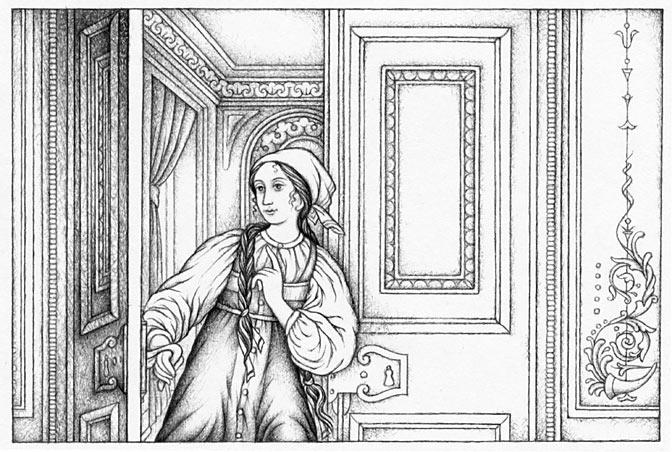In the fall of 1830, for arranging financial affairs before his marriage, A.S. Pushkin goes to the estate of his father Boldino in the Nizhny Novgorod province. The trip was supposed to be short-lived, but the cholera epidemic that swept over part of Russia delayed the poet in the village for three long months. Forced retreat aroused inspiration, and months in solitude became extremely fruitful for the poet. Boldin autumn - this is what this period in Pushkin’s creative life will be called. One of the masterpieces created by the poet these days is Belkin's Tales, a series of small prose works allegedly told to the author by a retired lieutenant. These stories are very different in content and mood, but they are united by their close attention to the personality of a simple person, a deep philosophical view of life events and experiences associated with them, leading, at times, to fatal twists of fate. The story "The Young Lady-Peasant" by Pushkin is one of this cycle. This light, very elegant piece is knocked out by its sparkling vaudeville from the general system. However, the events described in it are no less fatal for the main characters.
A.S. Pushkin "The Young Lady-Peasant." Story content
In short, the plot of this work can be described as follows. Having learned that the son Alexei from Petersburg came to a neighbor on the estate, the young lady Lisa wants to meet him. But how to do this, because their landowner fathers are in a long, irreconcilable quarrel? Then Lisa, on the advice of her resourceful servant, dresses up as a peasant woman, Akulina, and early in the morning goes mushrooming to a nearby forest, where she meets Alexei. Amazed by the beauty, intelligence and unusual behavior of the imaginary peasant woman, Alex falls in love with the girl, who also reciprocates.

The hunting incident most unexpectedly brings together the fathers of young people, landowners of Murom and Berestov. Grigory Ivanovich Muromsky, Lisa’s father, invites his neighbors to dinner, where Lizaveta Grigoryevna should be officially introduced to her father and son Berestov. The girl is confused, afraid that Alexey will recognize her, she continues the masquerade, this time dressed as a whitened, powdered, discharged and stiff “doll”. The effect was achieved, involuntarily comparing the two girls, Alexei falls even more in love with the sweet, simple and such natural Akulina, "turning her eyes away" from Elizaveta Grigoryevna.
Meanwhile, the fathers of the landowners, wanting not only to extend a sweet acquaintance, but also to become related, want to marry their children. Alexei in despair, he decides, contrary to his father’s desire, to offer Akulin’s hand and heart, having lost his inheritance and ties with his environment. To speak with Lizaveta of Murom, he comes to her and, having caught a girl without makeup, recognizes in her his beloved Akulina. There comes a happy denouement of history.
What is the special charm and attractiveness of this small work written by A.S. Pushkin? The “Young Lady-Peasant”, whose main characters are Lisa Muromskaya and Alexey Berestov, attracts with a description of very lively images, simple, sincere feelings and direct outlooks on life. Lisa and Alexei are ready to overcome the prejudices inherent in their environment, for the sake of personal happiness and love.
The story "The Young Lady-Peasant" by Pushkin was written in a traditional romantic style. Her composition resembles the common plots of romance novels and novels of the late XVIII - early XIX centuries. However, Pushkin's “Young Lady-Peasant”, in her artistic merits, undoubtedly differs from similar analogues. Her characters are very “lively” and charming and, despite the romantic “lining”, are very realistic, and their feelings are described with such inimitable depth and charm. The slightly fantastic plot of Pushkin's The Young Lady-Peasant story itself makes the reader think about the oddities of human fate. And it’s nice if all the intricacies and “games” end well, but it can be quite different.